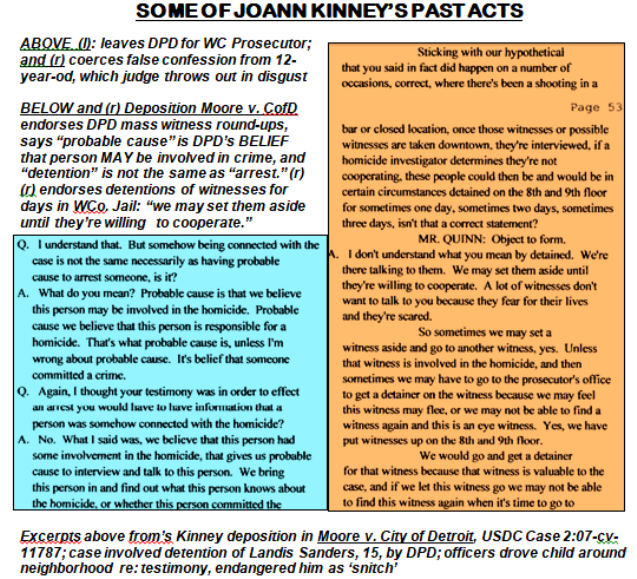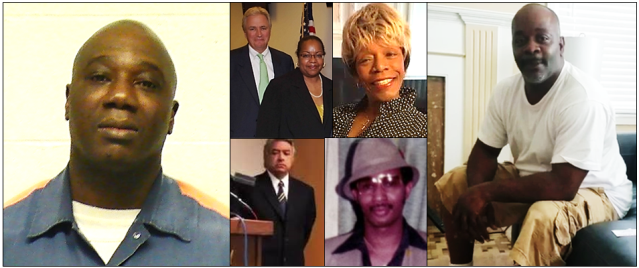
Carl Hubbard (l) and Curtis Collins (r) say Hubbard’s wrongful murder conviction resulted from the actions of (center clockwise) former Judge Richard Hathaway, DPD Sgts. JoAnn Kinney and Ronald Gale, AP James Gonzalez, and others, including DPD Sgt. Richard Ivy.
Hubbard, new atty. tell 6th District Judges he has “a colorable claim of actual innocence;” based on “extremely thin evidence at trial,” witness statements not seen by jury, DPD cops’ history of frame-ups, other issues
Court, prosecutor, DPD officers involved in alleged frame-up are now on staff of Wayne Co. Prosecutor Kym Worthy or have been in recent years
By Diane Bukowski
February 14, 2023

U.S. 6th Circuit Court of Appeals, Cincinnati, Ohio
DETROIT — Carl Hubbard has been battling his conviction of the 1992 murder of Rodnell Penn on Detroit’s east side against all odds, largely on his own, filing impressive pro se pleadings in recent years, even while surviving a severe case of COVID-19.
Now he has made it to the U.S. Sixth Circuit Court of Appeals, after U.S. District Court Judge David Lawson granted him a certificate of appealability on one issue: whether he has a “colorable claim of actual innocence that excuses the untimeliness of his habeas petition.” The Sixth Circuit has appointed Washington, D.C.-based attorney Alexander Kazam to represent him.

Atty. Alexander Kazam
“Rodnell Penn was shot and killed on a street in a high-crime neighborhood in Detroit on a winter night in 1992,” Kazam’s brief begins.
“The State charged Carl Hubbard with the murder, but Hubbard has always maintained his innocence. The State presented no eyewitnesses, and never recovered any physical evidence connecting Hubbard to the crime, no murder weapon, no forensic evidence, and no stolen property. . . Meanwhile Hubbard denied even being at the scene at the time of the murder. He presented an alibi through the testimony of two friends who confirmed that he was at their home that night. Nevertheless, Hubbard was convicted of first-degree murder and sentenced to life in prison.”
Read entire brief at http://voiceofdetroit.net/wp-content/uploads/Carl-Hubbard-6th-Circuit-Court-Appellate-Brief-12-19-2022.pdf
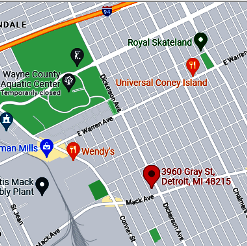
3960 Gray, Detroit , MI
Hubbard was convicted of the 1992 murder of Rodnell Penn outside 3960 Gray, after a three-day bench trial in front of Recorders Court Judge Richard Hathaway, who sentenced him to life without parole.
Afterwards, an eyewitness to the Penn murder came forward and swore in a detailed affidavit that he saw another man gun Penn down outside a home at 3960 Gray near Mack Avenue. But police never interviewed that witness, or others who lived nearby who agreed on the likely identity and motive of the killer. The eyewitness said he was across the street from the address at the time, but was afraid to come forward because he feared retaliation.
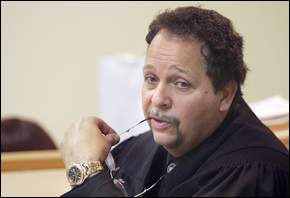
36th DC Judge Ronald Giles, formerly Hubbard’s trial atty. See affidavit below.
He said he saw Penn and another man arguing, and when Penn walked away, the man shot him in the back, then stood over him and repeatedly shot him again on the ground. He said the killer got into a car with several other men and left. (Names of this witness and alleged killer withheld due to pending court action and safety concerns.)
His affidavit and dozens more from parties who support Hubbard’s innocence claims are included with Kazam’s brief. Hubbard gathered their affidavits together over the years, never ceasing his fight.
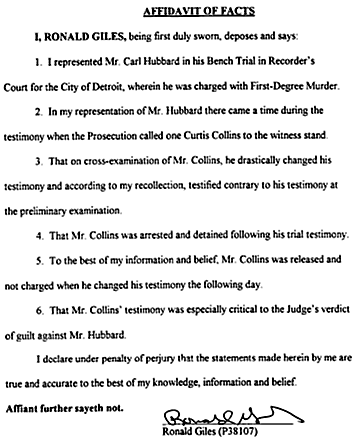 Hubbard’s conviction was primarily due to “especially critical” testimony by Curtis Collins, 19, that he saw Hubbard in the area of the murder, according to his attorney at trial, Ronald Giles (now a Judge at Detroit’s 36th District Court.)
Hubbard’s conviction was primarily due to “especially critical” testimony by Curtis Collins, 19, that he saw Hubbard in the area of the murder, according to his attorney at trial, Ronald Giles (now a Judge at Detroit’s 36th District Court.)
After Collins recanted on the first day of trial, Wayne County Assistant Prosecutor James Gonzalez drove him from the stand, ordering his arrest by DPD officer Ronald Gale directly after he testified in front of Judge Hathaway. Collins was held in the Wayne County Jail for two days.
Collins has repeatedly sworn since that DPD Homicide Investigator Sgt. JoAnn Kinney, officers Richard Ivy and Ronald Gale, AP James Gonzales, and others threatened to have his parole revoked because they found drugs on him, and to charge him with perjury and the murder itself, if he did not change his testimony. Fearing a return to prison, he did so on the third day of Hubbard’s trial.
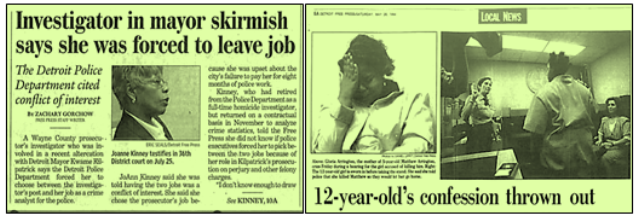
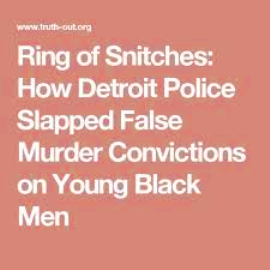 Sgt. Kinney, by then a detective with the Wayne Co. Prosecutor’s Office, testified regarding similar DPD practices in the case of Moore v. City of Detroit, USDC 2:07-cv-11787. She claimed they were legally valid police actions used routinely during the now infamous “Ring of Snitches” era in the 1990’s and continuing into the next century. She said police BELIEFS constituted “probable cause” for witness “detentions” in the Wayne County Jail, denying they were “arrests.”
Sgt. Kinney, by then a detective with the Wayne Co. Prosecutor’s Office, testified regarding similar DPD practices in the case of Moore v. City of Detroit, USDC 2:07-cv-11787. She claimed they were legally valid police actions used routinely during the now infamous “Ring of Snitches” era in the 1990’s and continuing into the next century. She said police BELIEFS constituted “probable cause” for witness “detentions” in the Wayne County Jail, denying they were “arrests.”
Kinney put her beliefs into action in the notorious case of Thoanchelle Taylor, a mother of two. Police locked her up as a witness to a murder in 1992 and held her until her 12-year-old daughter and 6-year-old son implicated her in the death.

Joann Kinney today/FB
Judge Kathleen McDonald said she was outraged that police charged her with murder without a “scintilla of evidence.” She added, “If I have ever seen a case where the police have manufactured the facts, this is one. I have never had facts as egregious as this case.”
“Kinney testified that she had Taylor locked up as a witness for days without charges against her and said there was no standard procedure as to how long witnesses could be held without being arrested. Kinney also admitted threatening to take Taylor’s children away if she did not cooperate. . .” the Detroit News reported at the time.
Kinney was also involved in eliciting a confession from a 12-year-old girl to a charge of murder of a child she was babysitting, by promising she could go home if she confessed. The confession was thrown out by a juvenile court judge in 1992.
Curtis Collins has affirmed his recantation multiple times, at Hubbard’s trial, in multiple affidavits and on a video for Voice of Detroit (above).
A Detroit police officer gave Collins a polygraph exam in 2017, recording his impressive detailed account of the alleged frame-up before proceeding to the questions for the exam. The examiner found that Collins was truthful when he said he did not see Hubbard kill Penn, and told him at the end that he basically believed his account of the entire frame-up, including that he was not in the area, despite his doubts that the police would have pulled off the conviction solely based on Collins’ testimony.
The pertinent part of the polygraph video below begins at about 17 minutes in, after initial preparations.
Kinney has been employed as a detective by the Wayne County Prosecutor’s Office since 2006, one reason Hubbard says he refused to give the Prosecutor’s Conviction Integrity Unit permission to take his case. In response to VOD’s inquiry, Maria Miller, Communications Director for Wayne Co. Prosecutor Kym Worthy, confirmed the following:
“Ms. Kinney is a detective in the WCPO. She does not work on CIU cases. Richard Hathaway [Hubbard’s trial judge] is the Chief Assistant for WCPO. James Gonzales is retired; he was the head of the Special Prosecutions Section. Mr. Gonzales started working in WCPO in the mid-1980’s and retired approximately 4 years ago.”
Regarding Hubbard’s case, Atty. Miller said,
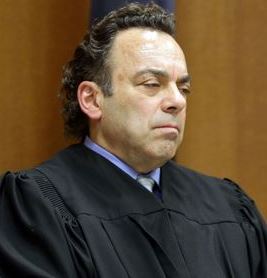
3rd Judicial Circuit Court Judge Lawrence Talon
”Mr. Hubbard sent his case into the WCPO CIU, but later he requested that he no longer wanted his innocence claims investigated, and the case was transferred back to appeals. He had raised his claims in a Motion for Relief from Judgement before Judge Lawrence Talon. The motion was denied. He appealed the denial of relief in both the Court of Appeals and MSC culminating in the MSC denying leave to appeal on June 17, 2020.”
Judge Talon’s ruling in Hubbard’s case was based on his assessment that evidence presented by Hubbard was not “newly-discovered” and that those who signed affidavits were “not credible” in Talon’s view. He did not order an evidentiary hearing to determine the credibility of the statements.
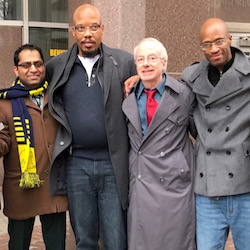
Exonerees Kendrick Scott (2nd from l), Justly Johnson (r) with Attys. Imran Sayed and David Moran, U-M Innocence Clinic
“Neither the police not the prosecutor intimidated the witness after his initial recanting,” Judge Talon wrote. “The police and prosecutor have not intimidated the witness because the witness was forced to face perjury charges or testify against a man accused of murder. There was no intimidation, only a tough choice that Collins had brought about by his own actions. The prosecutor did not withhold evidence. Neither the police nor the prosecutor had a reason to threaten Collins. As the facts have shown, there was no Brady violation.”
He added, “Defendant argues that he does not need to [show good cause for not raising evidence earlier] because he is actually innocent. However, defendant was seen in the area both before and after the shots. Indeed, Defendant’s multiple lies to the police showed his guilty state of mind. This court also finds that the Defendant’s alibi witnesses were not credible.”
Prior to Talon’s 2019 ruling, the Michigan Supreme Court held in the case of two defendants, Justly Johnson and Kendrick Scott, that only a jury, not the judge, can weigh in on the credibility of witnesses. They also upheld the use of witness affidavits as long as they were not the sole source of an innocence claim. Johnson and Scott went on to be fully exonerated, with the support of the Wayne County CIU, and won an $8 million verdict against the City of Detroit in a civil lawsuit
The Wrongful Conviction Story of Andre Lee Nelson: Joann Kinney got false confession from man who could not read and write, had IQ of 55
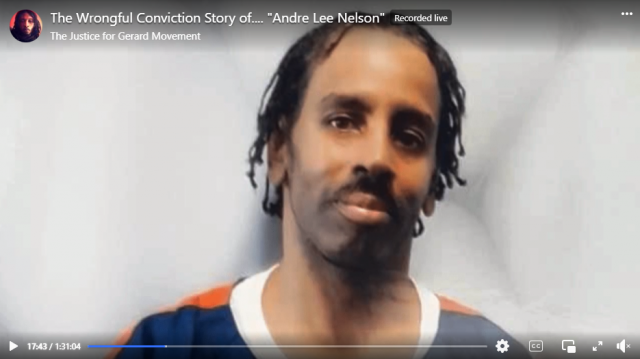

Jay Love
Andre Lee Nelson, who is serving life for first-degree murder based on a confession written by Kinney despite his low IQ and inability to read and write, says his case has been languishing with the CIU for five years.
His sister Yolanda Nelson described Kinney’s actions on a recent “Wrongful Conviction Task Force” report by radio personality Jay Love.
See entire video above by clicking link below:
https://www.facebook.com/watch/live/? ref=watch_permalink&v=5398198343642699
WCPO’s communications director Maria Miller commented only, “This case is currently an open file that is awaiting review by the WCPO CIU.”
U.S. v. City of Detroit, Michigan
2:03-cv-72258 | U.S. District Court for the Eastern District of Michigan
Detroit police and prosecutor’s practices of witness round-ups and coercion in Hubbard’s the other cases involving Joann Kinney were condemned and banned as unconstitutional by the U.S. Department of Justice, in the 2003 consent decree between the the city and the DOJ. The DOJ alleged a pattern or practice of unconstitutional misconduct by officers of the Detroit Police Department (DPD), including excessive force, holding cell conditions and arrest and detention policies and practices.
WRITE CARL HUBBARD AT:
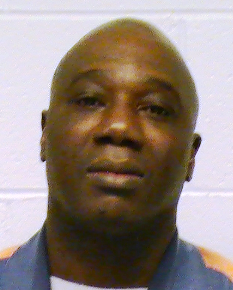
Carl Hubbard (MDOC photo)
Carl Hubbard #205988
Carson City Correctional Facility
10274 Boyer Road
Carson City, MI 48811-9746
RELATED STORIES:
**********************************************************************************


 Voice of Detroit is a pro bono newspaper, now devoting itself entirely to stories related to our PRISON NATION and POLICE STATE. Funds needed now to pay quarterly web hosting fee of $460.00, due March 4, 2023. VOD will disappear from the web if fee not paid.
Voice of Detroit is a pro bono newspaper, now devoting itself entirely to stories related to our PRISON NATION and POLICE STATE. Funds needed now to pay quarterly web hosting fee of $460.00, due March 4, 2023. VOD will disappear from the web if fee not paid.
VOD’s editors and reporters, most of whom live on fixed incomes or are incarcerated, are not paid for their work. Ongoing costs include quarterly web charges of $460.00, P.O. box fee of $180/yr. and other costs including utility and internet bills, costs for research including court records and internet fees, office supplies, gas, etc.
Please DONATE TO VOD at:
https://www.gofundme.com/donate-to-vod
************************************************************************************

